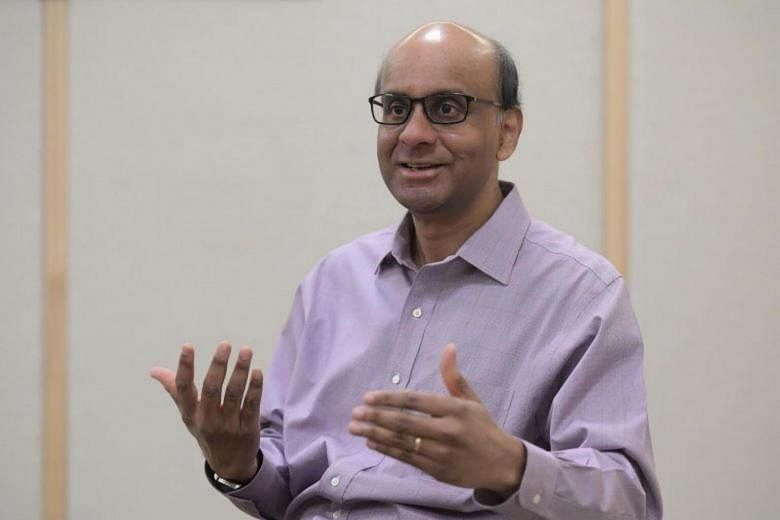SINGAPORE - To ensure that more children adopt healthy eating habits in their early years, the Government will progressively tighten the nutritional content requirements in food served in pre-schools, Deputy Prime Minister Tharman Shanmugaratnam said on Saturday (Oct 27).
Already, wholegrains, fruits and vegetables are being served in pre-schools, while sugary drinks and deep-fried food are not allowed, following enhancements to the nutritional requirements earlier this year.
But more can be done, as pre-school is an opportunity to shape the tastes and preferences of children, said Mr Tharman, who was speaking at a dinner to mark the 160th anniversary of KK Women's and Children's Hospital (KKH).
This is part of broader efforts to give every child a good start, with healthcare institutions such as KKH already playing an integral role in bringing care into the community, he said.
In his speech, Mr Tharman touched on the importance of a child's early years in enabling them to achieve their full potential in life.
"We want, in particular, to do more to help those who start off from a disadvantaged position to reduce early deficits, and to achieve their full potential in school and through life," he said. "Our early interventions will also help in our broader efforts to keep social mobility alive in Singapore."
Reaching out to kids with developmental delays
Children with developmental delays are among those who deserve additional attention, Mr Tharman said.
To better cater to the varying needs of this group of children, the Ministry of Social and Family Development (MSF) plans to further increase support for them within the mainstream pre-school setting.
The ministry is exploring an enhanced Development Support programme, which will allow children who have made sufficient progress in centres running the Early Intervention Programme for Infants and Children (Eipic) to continue to receive support within their pre-schools, he said.
Eipic provides developmental and therapy services for children with developmental problems, including physical, intellectual and learning disabilities, and autism spectrum disorders.
It caters to children under the age of seven with moderate to severe developmental problems.
Having an enhanced Development Support programme will enable early intervention professionals to support and co-teach the child alongside the pre-school teacher.
The Development Support scheme began in 2009 as a pilot initiative by a group of KKH professionals, and was later adopted and expanded by MSF in 2013.
It aims to help children with mild developmental needs overcome their conditions and improve in areas such as in their language, literacy and social skills.
Consultants from KKH, together with their counterparts at the National University Hospital, had helped to build capabilities and enhance early intervention standards in these Eipic centres.
On top of this, the ministry will also be setting out clearer guidelines for service delivery across Eipic providers, including introducing greater standardisation in how children are identified for these programmes, said Mr Tharman.
Helping kids from low-income families
The Government will also strengthen efforts to help children from low-income families and vulnerable backgrounds get a leg-up.
The issues faced by these families are multi-faceted, said Mr Tharman, adding that the Government's approach has since evolved from one that is programme-centric to a more child- and family-centric one.
"We are also paying special attention to children growing up in a stressful environment, such as when they are separated from a parent, or where there is some other family turmoil. And we will make sure that financial circumstances are no barrier to the kids getting quality attention," he said.
He added that a focal point in these efforts is the KidSTART programme, which built on an earlier 2014 programme by KKH called KIDS 0-3.
The KIDS 0-3 programme provided mothers and babies from vulnerable families with integrated health and social support, from pregnancy until the baby is three years old.
Its aims were to ensure that a child develops healthily and the mother's well-being is taken care of.
Mr Tharman said that the KidSTART pilot initiative, which was launched in July 2016, has received encouraging feedback so far.
"Parents feel better supported and are more confident in their parenting skills," he said.
However, he added that "this will be a journey that we will stay on for the long term, with a lot of learning along the way on what works better and what doesn't work so well".
In his speech, Mr Tharman also touched on how KKH, as a veritable Singapore institution, has embarked on its strategies for the future. These include finding innovative ways to keep healthcare affordable, such as implementing tele-consultation, and helping patients stay healthy in the first place.
KKH was founded in 1858 as a general hospital, and became a maternity hospital in 1924.
In 1966, it entered the Guinness Book of Records for delivering the most number of babies of any hospital in the world (39,835 then), a record it held for the next 10 years.
Over the years, more than 1.2 million Singaporeans were born in KKH.


